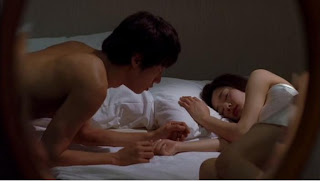Australian cinema really has come into its own again as of late. No longer the exploitation industry it used to be in the 70’s and 80’s it’s now a country producing some of the most exciting, thrilling and challenging films in the world. From films like The Book of Revelation to Coffin Rock and The Horseman to Van Diemen’s Land, it’s a country that continues to release impressive and daring material that remains underappreciated in Australia as much as it is outside of the continent. Horror films like Wolf Creek have really brought attention to the dangers of the outback, but that’s a fear older than Australia itself. Director Sean Byrne however, has something far more delicious in store for us here with his feature debut, The Loved Ones.
Brent (Xavier Samuel), a depressed teen who enjoys a spot of self harming after the death of his father could never have imagined the trouble he finds himself in once he turns down a prom request from the school loner, Lola (Robin Mcleavy). On the night of the prom he is kidnapped by a man and held hostage. Turns out that what Lola wants, Lola gets and Daddy doesn’t take too kindly to anyone who doesn’t give in to her. It’s going to be one hell of a night for poor Brent.
There’s simply no describing how lusciously delirious this movie is. Lola and Daddy are destined for cinematic legend, they’re a duo so warped and deranged it’s hard not to get sucked up into their world. The film captures their mentality perfectly through the visuals; imagine a David Lynch film crossed with the teen-angst of Heathers and you’ll have a taste of what the film’s aiming for. It also remains as unpredictable as a Lynch film, pending you haven’t seen the spoiler heavy UK trailer – avoid it if you can! – and it’s within this unpredictable craziness that the film thrills.
Equally as thrilling and unpredictable is new-comer Robin McLeavy. She embodies insanity here, but there’s a sultry side to Lola that attracts us to her. It’s this image of a blood-drenched girlie-girl that lingers in the memory, viciously screaming like a spoilt brat if she can’t get what she wants one minute and violently attacking the next: it’s this sassy psychotic that will bring Lola into horror legend. Then we have Daddy, a sickening paternal figure that will stop at nothing to please his daughter, even if it means ruining his happiness in the process.
The film is also surprisingly brutal. Brent is tortured and tormented in pretty explicit fashion, but it never crosses the line into straight exploitation. It’s graphic, it’s bloody but it’s never too excessive or discomforting that it alienates us. It’s thanks to this control from Sean Bryne that The Loved Ones ranks as not just the freshest horror film of the year, but also the most enjoyable. It’s a film that’s as sexy as it is shocking and as funny as it is violent; it’s everything horror should be. None surprising then that the film has been completely shafted by distributors, on a global level it would seem, getting the straight to DVD treatment here in the UK, the US still has no release date and the film is only just hitting cinemas in its native Australia! The Loved Ones is contender for horror film of the year; hopefully its audience will find it and cherish it on the home entertainment scene. Still, it would have been a treat to see this on the big screen! Highly recommended!































